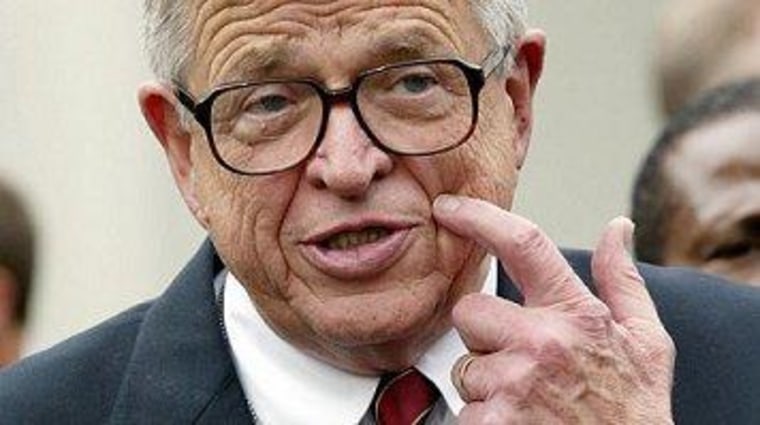Looking back over the last three decades, the religious right movement has had some notable, high-profile leaders, many of whom have enjoyed considerable national prominence. Figures like Pat Robertson and Jerry Falwell, though widely loathed by the American mainstream, became household names as the influence of conservative evangelicals grew.
Chuck Colson never enjoyed quite as much notoriety as his televangelist brethren, but when it came to the larger movement, the former Nixon aide who died over the weekend was every bit the religious right powerhouse.
Charles W. Colson, who as a political saboteur for President Richard M. Nixon masterminded some of the dirty tricks that led to the president's downfall, then emerged from prison to become an important evangelical leader, saying he had been "born again," died on Saturday. He was 80. [...]Mr. Colson was sent to prison after pleading guilty to obstructing justice in one of the criminal plots that undid the Nixon administration. After having what he called his religious awakening behind bars, he spent much of the rest of his life ministering to prisoners, preaching the Gospels and forging a coalition of Republican politicians, evangelical church leaders and Roman Catholic conservatives that has had a pronounced influence on American politics.
As a young player in the Nixon White House, Colson was praised for his "instinct for the political jugular" and "vying for favor on Nixon's dark side," but after his release from prison, Colson created a religious right group call Prison Fellowship Ministries, which he parlayed into celebrity status among evangelical conservatives.
Though ostensibly focused on preaching to inmates, Colson and his group gained considerable influence in the larger religious right effort, eventually becoming a popular speaker at far-right events and getting his own syndicated radio show.
But it was the George W. Bush era that made Colson an even more notable figure. After Gov. Jeb Bush (R) restored Colson's rights to practice law and vote, the Republican president looked at his prison ministries as a great example of the Bush "faith-based" initiative working in real life.
The problem was, Colson's efforts didn't work quite as well as he'd led others to believe.
My friend (and former colleague) Rob Boston wrote a piece several years ago on the ways in which Colson's programs were in conflict with the separation of church and state -- when the government uses tax dollars to convert inmates to evangelical Christianity, there's a problem -- and By Mark A.R. Kleiman, before his blogging career, found that the efficacy of the prison efforts didn't match the hype.
You don't have to believe in faith-healing to think that an intensive 16-month program, with post-release follow-up, run by deeply caring people might be the occasion for some inmates to turn their lives around. The report seemed to present liberal secularists with an unpleasant choice: Would you rather have people "saved" by Colson, or would you rather have them commit more crimes and go back to prison?But when you look carefully at the Penn study, it's clear that the program didn't work. The InnerChange participants did somewhat worse than the controls: They were slightly more likely to be rearrested and noticeably more likely (24 percent versus 20 percent) to be reimprisoned. If faith is, as Paul told the Hebrews, the evidence of things not seen, then InnerChange is an opportunity to cultivate faith; we certainly haven't seen any results.
This didn't undermine Colson's status as a religious right heavyweight, and he remained an influential voice until his recent ailments, working to "pull together a united front of right-wing religious orthodoxy" against modernity and church-state separation.
